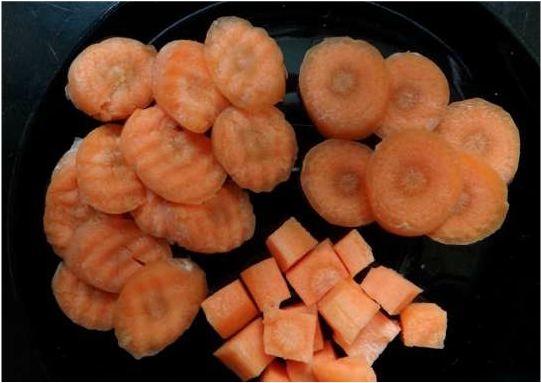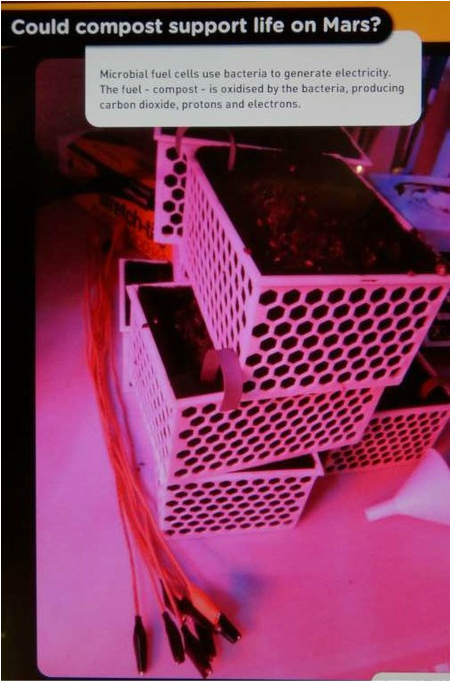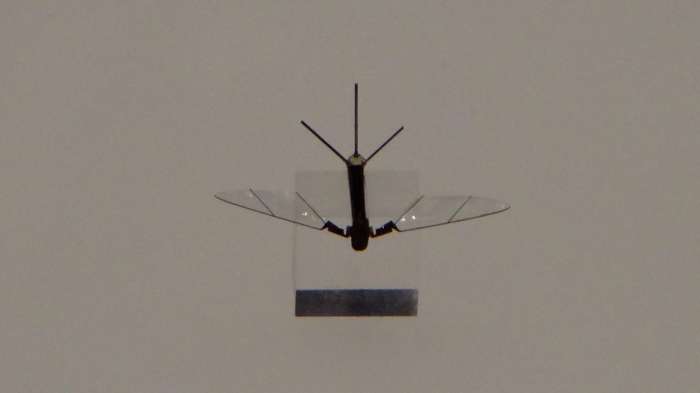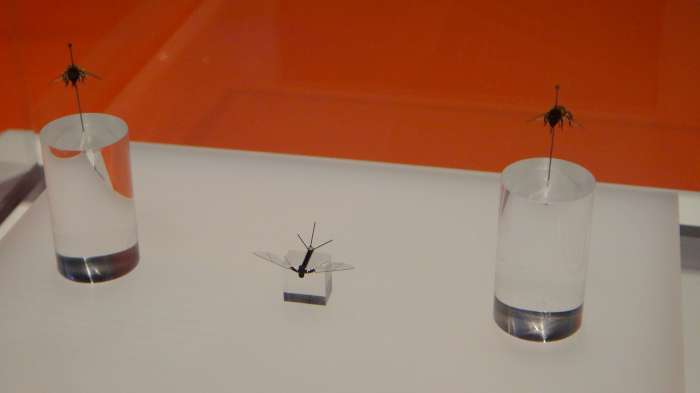But at least now I know there is a new science called gastrophysics that studies which unlikely factors determine how your food "tastes", as in: eating your meal from a square plate instead of a round plate, for instance. Fascinating stuff on which I would love to learn more! Because, these people might one day be able to tell me why carrots taste so much better when simply sliced before being steamed - and so much worse when cut into cubes or sliced with those wavy knifes! Ever noticed? One of life's big mysteries.
Back to the Science Museum. In the same area (called 'Antenna') other newish discoveries and inventions are featured, too. And two of them piqued this gardener's curiosity. The first was about "Could compost support life on Mars?"
To quote: "Renewable energy sources and sustainable living will be crucial to Mars missions because transporting traditional fuel will be difficult and Mars probably has no fossil fuels." The display went on to explain that a team of scientists had completed a simulated Mars mission and done all sorts of experiments: amongst other things, they 3D-printed fuel cells designed to run on food waste. Bacteria in the compost produce electrons which generates electricity. Seven small cells produced the same energy as a solar cell: 700 millivolts.
Whilst this may not be all that much - it sure is a start. As they say, every little counts. Also, the cells were rather small, containing no more than perhaps a litre of compost. Will I see the day, I wonder, when I can plug my laptop into the compost heap? Always described by gardeners as "black gold", with rising fuel costs we might be cultivating a gold mine in the more literal sense! :-)
The second invention caused divided feelings. The Robobee is, as the name implies, an artificial bee - a flying robot, to be precise. With polyester wings and a carbon fibre body, it needs to beat those wings 120 times per second to stay in flight. Scientists apparently want swarms of Robobees to communicate and work together to perform tasks. The main obstacle at present is that microchips needed for such "behaviour" are still too big. Likewise, the scientists are still developing batteries that are small and light enough to power the bee robots' flight without weighing them down.
"If these issues can be overcome", the exhibition screen stated, "swarms of Robobees could one day help pollinate our crops or assist in search-and-rescue or surveillance missions". It set of a train of thoughts and questions in my head.
There are the immediately obvious ones: What surveillance missions? Who will be in control? And can you drown them like wasps in syrupy traps if you don't want to be spied upon and perhaps photographed when having too much cake at a picnic? Would they sound an alarm and call out the doctor after the third slice - for you to be rescued from overeating?
Aside from the sinister spy function, there are other issues. What crops would they pollinate? Who should be the beekeepers and how would they decide which fields shall have a bumper crop and which are to miss out? Will the robobees be able to "see" the flower markings under UV light as bees do, to guide them to the nectar? And will they then compete with - and perhaps outcompete - the true bees? Like the grey squirrel pushed out the native red in most of Britain? Sure, they can't proliferate without human assistance, but I still wonder.
And what about the food chain? What if a bird tried to feed on them? Would birds be frightened away anyhow? They surely must hum differently? While the hum of true bees is one of the most cheerful and soothing sounds to the human ear (provided you didn't accidently attack them and they come after you in force), I can't image the Robobee having such pleasant effect. Will people still refer to "the birds and the bees"?
And what about the plants? Will pollinating by robot work? I somehow missed something looking like a brush at one end of the Robobee: while you can pollinate artifically, it usually is either done by shaking the flower or by using a small brush. The Robobee didn't look particularly soft and gentle. Will the plants object? Will the flower feel raped??
Did you know that plants "see" - though not in our sense, of course - if you come near them, stand over them and whether you wear a blue or red shirt, among other things? And that's just the start of the first chapter :-). I wonder if I'll ever be able to prune any plant again after I've finished reading... And I suppose I'll find vindication for all those gardeners who talk to their plants (though I'm afraid that won't include me - I tend to just swear at them when they don't do as I hoped...). There is a chapter called "What a plant feels" but I was good and didn't jump ahead. Yet. It'll be interesting and should bring me back to the question: Will Robobees make good lovers in terms of "producing" fertile seed in plants? Plants may not have emotions as we do, but they surely will feel the different "touch"?
And why you need never ever again apologize for getting filthy in the garden
- if you felt the need before
I called this post "Towards a happy future" so I kept the "happiest" "news" till last. In the January issue of a magazine by a well-known energy drinks producer I found this: 16 people, things and ideas that will change our lives in 2016 - and No. 8 said: "Bacteria sprays. One day these will replace our showers." The article tells about chemical engineer David Whitlock who apparently hasn't showered since sometime in the late 1990's (pole position on the invite list, I guess... Sorry.).
His start-up has developed a spray containing billions of little bacteria that will settle on the skin and then start munching up the dirt. Recommended dosage is twice daily. In days gone by, when people didn't shower almost daily and washed their hands with soap all the time, those bacteria would have been found naturally on the human skin, bringing about "cleanliness in a natural way by eroding our sweat". And preventing the rise of allergies in the process.
The spray, retailed apparently under the name Mother Dirt, "should give us the same healthy skin microbiome our unwashed ancestors had". And - gardeners around the world rejoice! - "the star of the spray can is Nitrosomonas eutropha, an ammonia-oxidising bacterium that normally lives in the soil beneath our feet." We always knew gardening is healthy and good for you. Now you can feel even better, knowing what money it might save you :-) !




 RSS Feed
RSS Feed